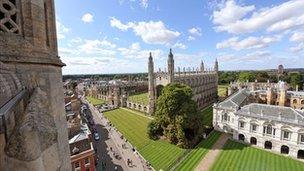Police 'tried to spy on Cambridge University students'
- Published

The activist had lived in Cambridge for many years
Police sought to launch a secret operation to spy on the political activities of students at Cambridge University, the Guardian has reported.
Covertly recorded film reveals an officer attempting to persuade an activist to become an informant in return for money, the newspaper said., external
Cambridgeshire Police said it used covert tactics legally.
Cambridge University Students' Union said it was "absurd" that its members were a focus for the police.
The officer wanted the activist to name students attending protests and list vehicles they travelled in.
The Guardian reported that the unnamed police officer wanted the activist - who wished to remain anonymous - to also identify leaders of protests and to search on Facebook for the latest information about protests being planned.
Officer 'not rogue'
The activist, who is in his 20s, wore a hidden camera to record the meeting with the officer, who is part of a covert unit.
He was asked to target "student-union type stuff" that would be of interest because "the things they discuss can have an impact on community issues".
Other surveillance targets proposed included campaign group UK Uncut, Unite Against Fascism, environmentalists and the group Cambridge Defend Education, the newspaper reported.
Cambridgeshire Police did not deny the facts of the Guardian's story, but said in a statement: "Officers use covert tactics to gather intelligence, in accordance with the law, to assist in the prevention and detection of criminal activity."
The Guardian journalist who reported the story, Rob Evans, told BBC Radio Cambridgeshire the officer "was not rogue".
"He was working for Cambridgeshire Police and he's working for a unit which the Cambridge Police don't want to specify, but essentially he is there monitoring political campaigners and he wants to recruit informants to do that."
Mr Evans said there were a total of two meetings between the officer and the activist that took place in October.
'Intrusive tactics'
Cambridge University declined to comment on the Guardian article, saying it is "a matter for the police".
But Cambridge University Students' Union (CUSU) said it was alarmed that its members were under police surveillance.
The union said in a statement: "CUSU has always constructively engaged with the police when planning or supporting protests and demonstrations.
"Tactics such as these are not only intrusive, they also waste time targeting groups which are involved in making important and positive change in our society."
The Guardian reported that the activist had been called by the police because he had been active in environmental and nuclear groups and had been arrested three times at demonstrations without being charged.
He was not a student at the university but had lived in Cambridge for many years and had friends who attended the university.
Isabella Sankey, director of policy for human rights campaigners Liberty, said: "That any group which dares to dissent is apparently fair game should alarm anyone committed to proportionate policing and democracy itself.
"Proper judicial checks on police surveillance are badly overdue - Parliament must take responsibility and act."
- Published6 November 2013
- Published29 October 2013
- Published1 March 2013